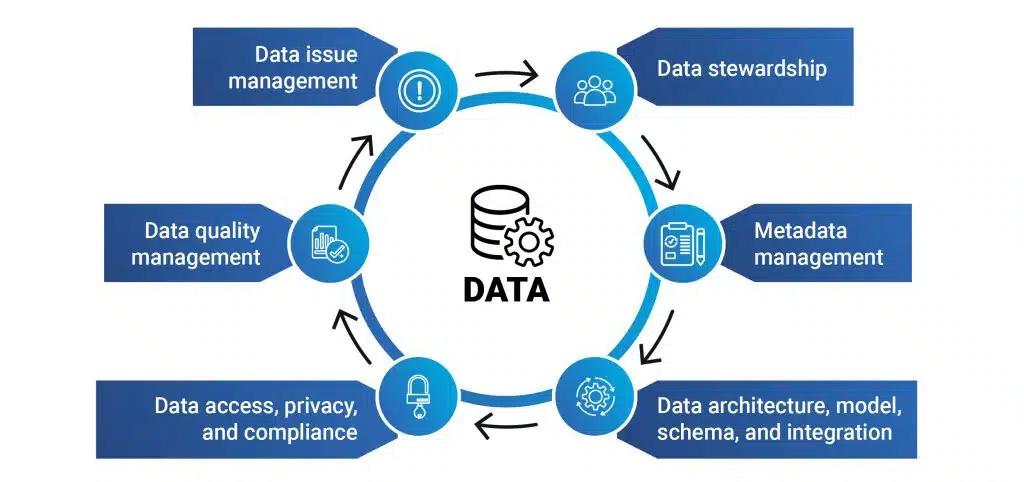Data democratization has become essential for investment management, but how you approach it matters. Learn best practices and how tools like Rivvit can help you more effectively share data.
In the world of investment management, data is the lifeblood that drives informed decision-making, optimal performance, and compliance with ever-changing regulatory requirements. Employees at all levels of investment management organizations recognize the value of investment and portfolio data and increasingly expect to have ready access to it. As a result, making this data available to employees has become essential. This is referred to as data democratization – in other words, providing employees at all levels with access to data and analytical tools to make informed decisions and contribute to the organization’s goals.
In this guide, we explore best practices for data democratization and highlight how investment data management and reporting capabilities offered by Grandview Analytics’ Rivvit software can help you distribute data and insights to employees easily and automatically.
The importance of data access and transparency
Sharing meaningful investment and portfolio data with employees is not just about transparency, it’s about empowering a team to make better decisions. When data is accessible and understandable, it leads to:
- Improved, efficient decision-making: Employees can make more informed decisions when they have access to accurate and timely data.
- Increased accountability: Data transparency promotes a culture of accountability, where everyone understands the metrics that deliver value and drive investment performance.
- Enhanced performance and collaboration: With the right data at their fingertips, both front-office investment teams and back/middle-office operational teams can identify trends, optimize strategies, and drive better results for the firm.
Best practices for data democratization
1. Know your audience
Understanding the specific data needs of various departments is crucial. For instance, portfolio managers require real-time performance metrics and market data to make informed investment decisions, while analytics and risk teams need detailed risk exposure reports and scenario analyses. Operations teams focus on trade settlements and reconciliations, and compliance officers rely on audit trails and regulatory reporting to ensure adherence to industry standards. By understanding these unique needs, you can ensure everyone has the information required to excel in their roles.
2. Use clear and concise visuals
Visuals are a powerful way to convey complex data, including point-in-time and time series data. Effective use of charts, graphs, and clickable dashboards can make data more accessible and easier to interpret. Visualization tools like Microsoft PowerBI or Tableau, integrated with a tool like Rivvit, allow for the creation of customized dashboards and reports that cater to the specific needs of your audience.
3. Ensure data accuracy and consistency
A single source of truth (the “gold copy”) is vital to maintaining data integrity and building trust among users. When users have confidence in the reliability of the data, they are more likely to use it effectively. Data quality management practices, such as detecting data issues and managing data exceptions based on business rules and quality standards, help ensure the data being presented is reliable and accurate. Rivvit’s data quality module does exactly this.
4. Implement user-friendly tools
Intuitive and accessible tools are essential for making data usable. For instance, Rivvit’s no-code query builder tool, Viewbuilder, allows users to build, save, and share custom queries and dashboards without the need to write code. Tools like this democratize data access and empower employees at all levels to engage with the data directly.
5. Leverage a document management library
Document management is an essential element of data democratization because it ensures that all relevant information is organized, accessible, and usable by employees across the organization. Use a well-structured document management system or library to store and archive reports, legal documents, file imports, and custom data extracts all in one place for easy access.
6. Develop risk management routines
Defining and tracking key performance indicators (KPIs), including operational and portfolio-level KPIs that leaders care about, are crucial for assessing organizational performance. In addition, investment risk management teams often incorporate tools for investment guidelines monitoring, including tracking eligibility criteria, concentration limitations, and other compliance targets based on portfolio strategies and/or regulatory requirements.
Real-time access to these metrics and KPIs ensures everyone is aligned with the organization’s goals and performance standards, allows teams to quickly identify areas of improvement, and adjust strategies accordingly. Providing clear and accessible views of these metrics, easily refreshed in a repeatable format, along with historical data, helps front-office personnel ensure their portfolios are managed within set parameters while adhering to regulatory and/or compliance requirements.
More accessible data helps surface data issues, driving accountability and stewardship which are critical elements of a robust data governance framework. Bringing a standard deck of KPIs and metrics along with the details to a monthly management team meeting, for example, will get the right eyes and scrutiny on the data.
Data Governance Framework
Leveraging Rivvit for optimal data democratization
While the above best practices are foundational, leveraging an advanced tool like Rivvit can further enhance your data democratization and sharing capabilities. Rivvit offers a robust suite of features designed to streamline data management and improve accessibility:
- Centralized Data Warehouse: Ensures data consistency and accuracy across the organization
- Advanced Data Visualization: Rivvit’s integration with PowerBI enables the creation of powerful and customizable dashboards
- Real-Time Status Dashboards: Track the real-time status of business-critical workflows, such as inbound data ingestion and outbound file delivery
- Investment Guidelines Monitoring: Monitor eligibility criteria, concentration limits, and other compliance targets
- Data governance: Enable data stewards to enforce best practices and ensure data integrity
Data democratization drives better results
In today’s data-driven world, effectively presenting investment and portfolio data to employees is crucial to organizational success. By following industry best practices and leveraging advanced tools like Rivvit, organizations can unlock the full potential of their data, driving better decision-making, increasing efficiency and accountability, and enhancing collaboration across teams.
Explore how Rivvit can transform your data management practices and empower your team with the insights they need to excel. Contact us for a demo.
ABOUT GRANDVIEW ANALYTICS
Founded in 2014, Grandview Analytics is proud to celebrate its 10-year anniversary as a technology consulting and investment data management software company serving financial institutions and investment managers. We offer data strategy, technology implementation, systems integration, and analytics consulting services as well as an outsourced investment data management and reporting service powered by our proprietary, cloud-based platform, Rivvit.
Our services drive improved business processes, integrated technologies, accurate and timely data, and enhanced decision-making capabilities. Our seasoned team of financial industry professionals brings deep business and technical domain expertise across asset classes and trade lifecycle. With hands-on financial industry experience, we execute on complex initiatives that help clients optimize ROI on data and technology investments.



